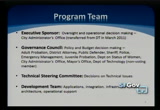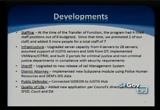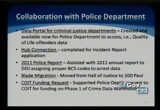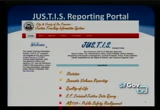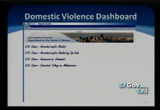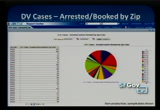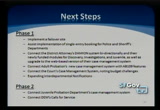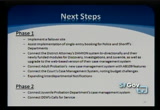tv [untitled] December 31, 2012 5:30am-6:00am PST
5:30 am
a third interpreter is saying it was a slap now that she's testifying on the stand. which is it? beyond a reasonable doubt, is complicated. the other issue is when the victims don't come in to testify. it's even more of a barrier for us to get past all of the language issues to be able to bring any of the others out in trial. it is very difficult. >> thank you so much jean. i am sure that the people who are cramming for evidence finals would be well advised to watch the segment. >> thank you christina. >> next we have an update of the justice system, justis.
5:31 am
from linda young. pieces of evidence floating or a longtime. i imagine everyone is trying to get the bad guy. there are pieces floating around, not everything came together. thankfully to the dogged persistence of -- especially when linda young, being able to pull the pieces together we are pretty much there. there will be more tweaks coming along. >> good evening commissioners. thank you for inviting the city administrator's office. my name is linda young, deputy city administrator. i will discuss quickly the justis project. the transfer of function to the city of ministers
5:32 am
administrator's office which occurred in march, 2011. our mission is to support the criminal justice department and need to share information in compliance. the justis project is to provide sharing data get abilities, provide individual case management system to address departmental business needs for the police department, the sheriff department, district attorney's office, public defender, adult probation and to connect the court system. the city administrator is the executive sponsor and will provide oversight and operational decision making .the council provides budget
5:33 am
decision-making. the technical steering committee meets on technical issues and we do that weekly. some of the development since the transfer of functions. at the time of the transfer from a staffing perspective the program only had four feel positions out of eight budget it. since that time we promoted to of our own staff and added two for a total of seven. increased from four servers to 28 serves. we implemented bm ware, built two portals. the sheriff department was able to update their new
5:34 am
release of jail management system. we work with the district attorney's office to implement the new subpoena model using police resources and mgis data. for the public defender's office would connected the system to the hub. we had a new application for the council direction for the sf police department, the sheriff department, courts and da. we created a portal with the police department so they can access information such as quality of life information. we help them with the 2011 justice department report so we were appropriately assigning bcs codes; we migrated their blades; and supported the police department request for -- funding for phase i.
5:35 am
we created a separate portal, a portal for non- criminal justice department so that we can present aggregate data in compliance, this is non- -- data, that is aggregated that the public should be able to see, in cooperation with the department and dr. -- i will show you four sample reports. the last things we implement it the first phase of interdepartmental notifications with criminal justice business processes so that when probations are booked, both the sheriff department and adult probation department is notified immediately. for the justice reporting portal, i want to show you sample reports. as you can see from little icons, if red, locked one, only justice department can see these reports. for public reports such as domestic violence it would be
5:36 am
open to the public. >> just to clarify again, for folks who are watching, justis is an acronym for the justice tracking information system. >> thank you commissioner. >> thank you. >> if i can show you the domestic violence dashboard, these are four reporter markup, dv cases, arrested and bailed; dv cases arrested and bailed by zip code; dv cases sentenced vs. dismissed; and dv cases convicted whether felony or misdemeanor. for the first report, if you look at the chart, this report will show by fiscal year the
5:37 am
number of cases. when you zoom in on the year you can see by month but the number of dv cases are, and my by days if you further zoom in. this is nonproduction sample data. this is mocking up for presentation purposes. if you look at this, this is for the period jan. 1, 2012, through dec. 4, 2012. by zip code you can see where the high incidence are. you can see 94103, 224 cases, and so on. this portal will also allow you to change the dates that you are looking at. if you are interested in fiscal
5:38 am
year versus calendar year, if you're interested in a particular month you can change the date and see the same data. for dv cases sentenced and dismissed what we wanted to show is this one is by fiscal year, what are the number of actual cases dismissed versus sentence and then we wanted to show the percentage count. in the last report, the convicted dv cases, what numbers were felonies versus misdemeanors? what are the critical reports they want to see? as a departments are hooking up and sharing their information with us we will then populate the fields. so we will assign mous with the various departments to be clear about what data is being shared, and what data is being shared publicly for the next.
5:39 am
the next step, we want to connect the district attorneys system bidirectionally, and the modules for discovery, an investigation and operate a case management system to a web-based version. we also want to connect the adult probation case management. and connect the course case management system; we note that they recently had budgetary challenges. we will be working with them next fiscal year to do that an expanding the interdepartmental notifications. phase 2, we want to help the juvenile probation case management system hook up as well as the department of emergency management calls for service. so quickly to acknowledge that none of this would be done
5:40 am
without the work of the justis and the justis council. they worked around the clock when the servers were down. the justis governance council participants -- they attend every one of our council meetings and provide valuable guidance and recommendations from the police department i will acknowledge susan -- andrew and rodrigo castillo. at this time if you have any questions? >> thank you very much, this is an important part of the puzzle with the justis ringing together information of the law-enforcement, district attorney's office and the support network understand and have an idea what the statistics are. this is incredible. thank you so much for your
5:41 am
efforts. >> thank you. >> commissioner turman: the fiscal year data on the mock-up goes back to 2010. does your data go back further than that? >> it goes back further than that. there is data going further back. >> within your portal? >> the data does exist; we just did not show it in this report. >> commissioner turman asked the question but i want to be clear that the data goes back further than what is indicated on the report. i also want to command and thank the team that is putting this together, the governance council, but certainly this is
5:42 am
something to be very clear that has been in the making for over a decade. this really started with the task force, which is now in oversight panel as we have mentioned previously. there is a teamwork and resources to make sure we have coordinated data that is appropriate for each department so that we can again have not only a birdseye view but it a ground view. we have come a long way. i waited a long time. as a member of this commission but also many of the folks introduced earlier who have
5:43 am
been working on something similar to occur for a long time. we have been somewhat puzzled by the fact -- as we often hear in these chambers and other matters, by the fact that certainly san francisco sits in the seat of such technological developments that are really evolving and reshaping the world on so many fronts, biotech, biomedical, engineering feats. will could not understand why we could not board and eight with the technology available, state-of-the-art information system. for our citizens. thank you very much. i am very excited. it seems as though we are exponentially improving. i don't expect that we will wait another 10 years for
5:44 am
similar reports. i am expecting that certainly within the next year we will be 10 steps further ahead. a few years ago it would've taken longer. i am very excited about this and excited that we can share this discussion with the police department commission. as far as the development of justice. thank you very much to all of that been involved. very critical. >> commissioner kingsley? >> ms. young, thank you very much for your report. it is very interesting. some of the questions i had have been addressed by commissioner schwatz's comments. i wanted more clarity around the timing and history of this. is 2012 the first compilation
5:45 am
of the statistics? is the system established for data collection, is that a permanent part of our system of data collection going forward that we will improve upon? i wanted it a sense of the permanency of this, the development of it, and not just the project that is done every 10 years or something of that nature. >> this is a very historic thing for me. and sitting down with doctor -- we talked about what is the definition of domestic violence and we really do need to go down the list of statutes and say is this in or not. the district attorneys office is tracking domestic violence cases, the police department
5:46 am
also. we are using the management system but as the systems hoping we will be able to show different sets of information to you. this is just the first touch of prototype reports. >> wonderful, thank you. >> not to over state, i think it is a critical question. it is not our intent that it be a project. this is something that would be a foundational, fundamental issue moving on. one of the challenges that we will face moving forward is one department only has a certain amount of resources to participate and to keep going, and another one isn't would
5:47 am
could end up with something lopsided. an uneven patchwork of data. as we move forward, we want to make sure we have the adequate resources to have this as even and equal participation is possible so that it is not just something that is not sustainable for the long term. >> thank you commissioner. >> commissioner chan. >> commissioner chan: thank you for your presentation. i want to ask a couple of clarifying questions. it looks like the justis project replaces the cable system. my understanding is that it is a database for local background check, i want to get more of
5:48 am
the big picture perspective and also want to find out - my understanding is that the cable system was not a system connected to any databases. i am wondering if the justis system will be different, connected to any federal database like the fbi or department of homeland security. >> i am the justis project manager. justis is designed to replace the aging cable mainframe system. each department is in the process or has completed the implementation of the wrong department specific case management system. though specific case management systems connect to justis is a way to exchange data between departments. since justis is at that how
5:49 am
point, it gives us the ability to all information and roll it up to public data as well as criminal justice data. what was your other question? >> i am wondering if justis is any different. >> i know their systems in the city and county of seven san francisco to collect to colect, for background checks, as far as justis replacing the cable system, justis will assist individual departments in creating the roll up reports.
5:50 am
we have not received whether to the technical steering committee or the justis council, and requirements to connect federally. >> i asked because of my background. i was curious because one thing that was helpful about the cable system is that you could do a check without reporting someone to immigration. i was curious about that. who analyzes the data? you should is the capabilities and the types of reports that we could pull. is their body that will pull the status of reports and doing an analysis on a regular basis? >> each department analyzes their data. the source of the data has to verify the data. they also have to be able to
5:51 am
give permission for other departments to use that data. the analysis belongs at the departmental level. what we do is that once the police department says okay, share the aggregate data, that is when we connect the two so the system can show the reports of the department of women. we don't own the data. the data resides with the department that originated it. >> thank you. >> we appreciate your efforts putting that together so that groups can see trends and recognize issues that we able to deal with. our next line item is a report of the san francisco police department regarding language access. and some of the concerns that were expressed by the assistant district attorney
5:52 am
jean roland about issues regarding interpretation. we have ms. sandra marion, from occ, to talk about language access. ms. marion? >> good evening. commissioners, director - members of the public and command staff and police officers. i'm excited to be here and have the opportunity to talk about the work that many organizations, departments and commissions in collaboration with the police department on language access. i work for the office of citizen complaints, in agency that provides civilian oversight of the police department. i will start our presentation giving a little history and identify some of the projects working on. there are other members of the group here, cheaf beal, officer
5:53 am
chang, language liaison, -- a member of the working group. he will talk some of the challenges that lap, domestic violence victims face and lastly beverly -- will make concluding remarks. she is also another vital member of our organization or our working group. a little bit of the history. six years ago a number of representatives from 22 organizations can together to work with the police department to write language access policy. we came together with the desire to improve services for the domestic violence victims and witnesses and family
5:54 am
situations. most certainly those concerns and specific cases were at the forefront of putting together this language access policy. within two years,the police commission adopted the language access protocol, department general order 5.20. it is one of the best in the country because it is comprehensive and it gives clear guidance. it requires a san francisco police department officers to provide language access or language services to limited english proficient individuals that they encounter in their law enforcement capability, and requires services if a lap person requires assistance. in san francisco on like many police departments there's over
5:55 am
150 bilingual officers and that is remarkable. if you look across the nation, san francisco is at the forefront at having such a source of bilingual officers. the department general order prohibits officers from relying on children, bystanders, family members to be interpreters unless there are exigent circumstances. once that is resolved, the police needs to have a bilingual officer or an interpreter from line with from language services language services to continue.
5:56 am
those in the community, trying to resolve situations of language access, this language liaison officer appointed through this general order. our work wasn't done when it was implemented in 2007. part of what we wanted to do was put together training, and a brochure for the public so they would know what their rights are and responsibilities. we put together a brochure, translated it into five different languages. it is the way in which individuals can learn about and exert their right to
5:57 am
language access. we continue to do work. there are people who were here, i want to give credit to commissioner chan, the district attorney office was involved, the department of the status on women, you were there at the beginning. and then the police department. there was a willingness in the leadership to move forward, to implement this department general order and to continue with the dialogue on how to best implement land with services that is what recently in the last year, a subset of this language access coalition
5:58 am
has come together. we are working on a variety of projects. one of the first was to have another kind of department bulletin for officers who touch upon the common indicators, signs, in a more complicated situation where the person understands some english but because of the complexity of interaction, the rights involved in the need of accuracy, an interpreter is required. would put together good indicators for police officers. the other thing that we worked on, a work in progress, roll-call training scenario based. that is an ongoing project. we have been working with the department, scripting it out, we hope that it will be rolled
5:59 am
out of the beginning of next year. under the project we are working on to enhance services, we devised a multilingual card so the police service aids, civilians, people that victims might think are officer, -- this is an important mechanism so that domestic violence victims coming to the station to file reports, there is immediate communication so that things can get moving in a rapid manner. on the technology side
93 Views
IN COLLECTIONS
SFGTV: San Francisco Government Television Television Archive
Television Archive  Television Archive News Search Service
Television Archive News Search Service 
Uploaded by TV Archive on

 Live Music Archive
Live Music Archive Librivox Free Audio
Librivox Free Audio Metropolitan Museum
Metropolitan Museum Cleveland Museum of Art
Cleveland Museum of Art Internet Arcade
Internet Arcade Console Living Room
Console Living Room Books to Borrow
Books to Borrow Open Library
Open Library TV News
TV News Understanding 9/11
Understanding 9/11


